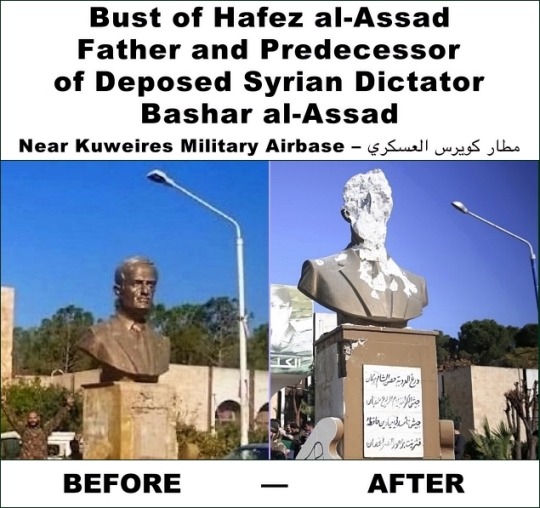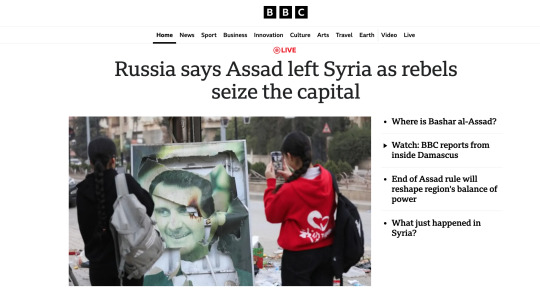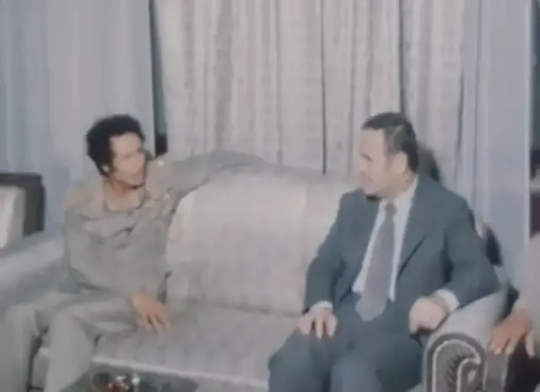#hafez al-assad
Explore tagged Tumblr posts
Note
I thought this was a blog about us presidents, no one comes here to read your thoughts on the mess in syria.
Well, first and foremost, this isn't a request line. I started this blog to write about whatever I want to write about and I've been doing that for 15+ years. It's not changing anytime soon. I don't care what you came here to read. It's not for you. If anybody finds anything interesting, it's an added bonus.
The collapse of a regime that has existed longer than I've been alive and has had an iron grip on one of the oldest continuous civilizations in the world is historic. And it's interesting to me, and I'll write about whatever interests me whenever I am interested by it. These moments should be fascinating to anybody who has an interest in history. You never know where the story is going to go from here, and that alone is interesting, as well. Just because it isn't "your" history doesn't mean it isn't historic.
When Bashar al-Assad succeeded his father in 2000, there was actually a significant amount of optimism around him. He was a London-educated ophthalmologist who was never intended to be Syria's leader but was thrust into the role after the death of his brother in a car accident. It was thought that he might be a reformer who would lead differently than the tyrannical rule of his father. There was hope that some real changes might take place in parts of the Arab world in 1999 and 2000 when King Hussein of Jordan, King Hassan II of Morocco, and Hafez al-Assad of Syria -- longtime rulers in their respective countries -- all died and were replaced by sons in their mid-30s (King Abdullah II in Jordan, King Mohammed VI in Morocco, and Bashar in Syria). Jordan and Morocco weren't in the same situation as Syria, especially considering the decades of close connections King Hussein and King Hassan II had with the United States, but there was still genuine hope about Bashar al-Assad in 2000.
Twenty-four years later, we know the path of history that Assad took, but these moments are hugely important -- not just for Syrians or Arabs or the Middle East in general, but for the entire world. What happens in Syria matters here. Don't forget that there are American soldiers on the ground in Syria. I'm from Sacramento and live in Los Angeles -- those two cities are almost twice as far apart as Damascus is from Jerusalem. Damascus is closer to Beirut than Sacramento is to San Francisco. Russia, Iran, Iraq, Turkey, Israel -- these countries are all intricately connected with Syria in various ways and have been for decades. If you aren't interested in what's going on in Syria today, that's your prerogative. If you don't think what's going on in Syria today makes a difference here, you are disturbingly ignorant.
#Syria#Bashar al-Assad#Assad Regime#Syrian History#History#Middle East#Arab History#Assad#Hafez al-Assad
101 notes
·
View notes
Text

The video is a speech Hafez made at the Non-Aligned Movement conference in Cuba in 1979
The speech was about Sadat and Palestine etc.
Seeing a Syrian tweeting in support of both Gaddafis makes me very happy 🤩🇸🇾🟩🧐
#Palestine#Hafez al-Assad#Bashar al-Assad#Assads#Syria#Gaddafi#Muammar Gaddafi#Saif al-Islam Gaddafi#Libya
11 notes
·
View notes
Text

There is no love for the al-Assad family which had brutally ruled Syria since 1971. Like North Korea, Syria turned into a hereditary autocracy.
Since the civil war began in 2011, a minimum of 580,000 Syrians have been killed. About 6,600,000 have fled the country and a similar number have been displaced internally. Putin's Russia has been propping up the régime for the past decade.
Hafez the father was not much better than Bashar the son. In 1982, Hafez massacred as many as 40,000 people in the city of Hama and largely destroyed it according to The Syrian Network for Human Rights.
Although Hafez has been dead since 2000, crowds struck back at him by torching his tomb.
youtube
#syria#dictators#hereditary autocracy#bashar al-assad#syrian civil war#hafez al-assad#1982 hama massacre#russian support for al-assad#kuweires#the syrian network for human rights.#الشبكة السورية لحقوق الإنسان#سوريا#حافظ الأسد#بشار الأسد#روسيا#حقوق الإنسان
4 notes
·
View notes
Text

#syria#assad family#hafez al-assad#anisa makhlouf#maher al-assad#bashar al-assad#bassel al-assad#majid al-assad#bushra al-assad
1 note
·
View note
Text
La Syrie, et après?
La chute du régime syrien provisoirement conclue par le départ du président Bachar al-Assad vers une destination pour l’instant inconnue (Moscou semble-t-il), a étonné par sa rapidité. La faiblesse du régime n’est pas une nouveauté puisqu’il n’a dû sa survie dans la guerre intérieure qu’a connu le pays de 2011 à 2017 que grâce à la fidélité de l’essentiel de son armée et à l’intervention de ses…

View On WordPress
#Bachar al-Assad#Hafez al-Assad#Hayat Tahrir al-Sham#Hezbollah#Iran#Processus d&039;Astana#Russie#Syrie#Turquie
1 note
·
View note
Text
Partial translation:
Camera man: tell us where you're going
Driver: I want to drive to Qardahah to shit on Hafez al-Assad's grave and come back!
Camera man: take a shit for us too!
33 notes
·
View notes
Text
Finally a statement from Assad. As copied and pasted from the news:
"Moscow - December 16, 2024
As terrorism spread across Syria and ultimately reached Damascus on the evening of Saturday, 7th of December 2024, questions arose about the president's fate and whereabouts.
This occurred amidst a flood of misinformation and narratives far removed from the truth, aimed at recasting international terrorism as a liberation revolution for Syria.
At such a critical juncture in the nation's history, where truth must take precedence, it is essential to address these distortions. Unfortunately, the prevailing circumstances at the time, including a total communication blackout for security reasons, delayed the release of this statement. This does not replace a detailed account of the events that unfolded, which will be provided when the opportunity allows.
First, my departure from Syria was neither planned nor did it occur during the final hours of the battles, as some have claimed. On the contrary, I remained in Damascus, carrying out my duties until the early hours of Sunday 8th of December 2024. As terrorist forces infiltrated Damascus, I moved to Lattakia in coordination with our Russian allies to oversee combat operations.
Upon arrival at the Hmeimim airbase that morning, it became clear that our forces had completely withdrawn from all battle lines and that the last army positions had fallen. As the field situation in the area continued to deteriorate, the Russian military base itself came under intensified attack by drone strikes. With no viable means of leaving the base, Moscow requested that the base's command arrange an immediate evacuation to Russia on the evening of Sunday 8th of December.
This took place a day after the fall of Damascus, following the collapse of the last military positions and the resulting paralysis of all remaining state institutions. At no point during these events did I consider stepping down or seeking refuge, nor was such a proposal made by any individual or party. The only course of action was to continue fighting against the terrorist onslaught.
I reaffirm that the person who, from the very first day of the war, refused to barter the salvation of his nation for personal gain, or to compromise his people in exchange for numerous offers and enticements is the same person who stood alongside the officers and soldiers of the army on the front lines, just meters from terrorists in the most dangerous and intense battlefields. He is the same person who, during the darkest years of the war, did not leave but remained with his family alongside his people, confronting terrorism under bombardment and the recurring threats of terrorist incursions into the capital over fourteen years of war.
Furthermore, the person who has never abandoned the resistance in Palestine and Lebanon, nor betrayed his allies who stood by him, cannot possibly be the same person who would forsake his own people or betray the army and nation to which he belongs.
I have never sought positions for personal gain but have always considered myself as a custodian of a national project, supported by the faith of the Syrian people, who believed in its vision. I have carried an unwavering conviction in their will and ability to protect the state, defend its institutions, and uphold their choices to the very last moment.
When the state falls into the hands of terrorism and the ability to make a meaningful contribution is lost, any position becomes void of purpose, rendering its occupation meaningless.
This does not, in any way, diminish my profound sense of belonging to Syria and her people - a bond that remains unshaken by any position or circumstance. It is a belonging filled with hope that Syria will once again be free and independent."
14 notes
·
View notes
Text

#hafez al assad#anisa makhlouf#assads#syria#those pyjama pants are amazing#and SO MUCH HAIR#i feel like bashar took this photo
11 notes
·
View notes
Text

Hafez x Bassel x Bashar
🦁x🦁x🦁
7 notes
·
View notes
Text

5 notes
·
View notes
Text

50+ years of rule by the Assad family in Syria is officially over.
#Syria#Assad Regime#Bashar al-Assad#Hafez al-Assad#Ba'ath Party#Assad Overthrown#Assad#Bashar Assad#Hafez Assad#Assad Family#History#Middle East#Arab History#Syrian History
35 notes
·
View notes
Text

Damascus, Syria, 1979
10 notes
·
View notes
Text
[σαν σύντομο διήγημα]
Τελειώνοντας ο Νοέμβριος, καθώς οι στασιαστές στα βορειοδυτικά της Συρίας ξεκινούσαν την επίθεση που αποσκοπούσε στην απώθηση των δυνάμεων του κ. Αλ Άσαντ, ο Πρόεδρος βρισκόταν μια ήπειρο μακριά σε μια ευφρόσυνη οικογενειακή συνάντηση. Ό μεγαλύτερος γιος του, Χαφέζ Αλ Άσαντ υποστήριζε τη διδακτορική του διατριβή στο [Λομονόσοφ, το] Κρατικό Πανεπιστήμιο στη Μόσχα.
Συγκε��τρωμένοι στο σπηλαιώδες, ξυλοντυμένο, αμφιθέατρο πάνω σε λόφο που αγναντεύει τη ρωσική πρωτεύουσα, ήταν η σύζυγός του κ. Αλ Άσαντ, Άσμα Αλ Άσαντ, καθώς και ο παππούς με τη γιαγιά του.
Η 98 σελίδων διδακτορική διατριβή –«Ζητήματα Αριθμητικής Πολυώνυμων σε Αλγεβρικά Αριθμητικά Σώματα» (Arithmetic Questions of Polynomials in Algebraic Number Fields)– μάλλον δεν θα ενδιέφερε το ευρύ κοινό. Διέθετε ωστόσο μια ξεχωριστή αφιέρωση: «Στους μάρτυρες του Συριακού Στρατου, χωρίς την ανιδιοτελή θυσία των οποίων κανείς από εμάς δεν θα υπήρχε.»
Ο Μπασάρ Αλ Άσαντ βρισκόταν κι αυτός στη Μόσχα αλλά δεν παρακολούθησε την υποστήριξη [της διατριβής].

Από τους New York Times https://www.nytimes.com/2024/12/21/world/middleeast/assad-regime-syria-final-days.html?smid=nytcore-ios-share&referringSource=articleShare // Εικόνα: Χαφέζ Αλ Άσαντ, γιός του Προέδρου Μπασάρ Αλ Άσαντ / https://tinyurl.com/ycxsydvw
————
#συρία#syria#lomonosov#moscow state university#λομονόσοφ#άσαντ#ασάντ#assad regime#assad#bashar al assad#hafez al assad
0 notes
Text
Syrian Rebels Destroy Hafez al-Assad's Tomb in Qardaha.
Copyright Hussein Malla/Copyright 2023 The AP. All rights reserved. In a significant development marking the collapse of the Assad regime, Syrian rebel fighters have destroyed the tomb of Hafez al-Assad, the late president and father of former president Bashar al-Assad. The mausoleum, located in Qardaha, the Assad family’s hometown in the north-western Latakia region, was set ablaze as armed…
0 notes
Text
.@BadlandsMedia_ #BreakingHistory
@ehret_matthew @GhostofBPH
@ColonelTowner
Recorded days before the #coup in #Syria, this presentation of the 1980s #US plan to Balkanize the #MiddleEast centers on #HafezalAssad's #panArab resistance in #Syria.
#PNACplan
https://rumble.com/v5vumhk-breaking-history-ep.-74-1200-pm-et-.html
0 notes
Text
The Assad family ruled Syria with an iron fist for 53 years.
It began in 1971, when Hafez Al-Assad became president under the Ba'ath Party, and ended when Bashar Al-Assad was ousted on December 8, 2024.
Bashar, an opthalmologist, became president upon the death of his father Hafez in 2000.
The presidency was intended for his older brother, Bassel, who died in a car accident in 1994.
0 notes